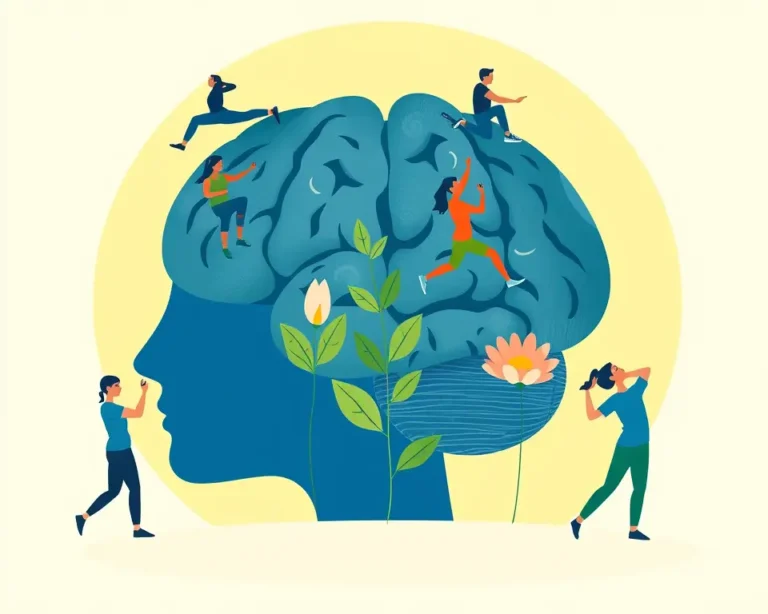May is Mental Health Awareness Month, a crucial time to highlight the importance of mental well-being. As a fitness expert, I’m here to share how exercise can be a powerful tool in boosting your mental health. Just as we prioritize physical health, nurturing our mental well-being is equally essential. Fortunately, many activities beneficial for physical health also support mental health.
The Mind-Body Connection: How Exercise Improves Mental Health
Regular exercise isn’t just about physical fitness; it’s a potent elixir for your mental well-being. People who exercise regularly tend to have better mental health and emotional well-being, and lower rates of mental illness. Exercise can improve your sense of control, coping ability, and self-esteem.
Chemical Changes in the Brain
When you exercise, your body releases a cascade of chemicals, including endorphins and serotonin, often referred to as “feel-good” neurotransmitters. These chemicals have a remarkable impact on your mood and stress levels.
- Endorphins: Act as natural painkillers and mood elevators, reducing feelings of anxiety and depression.
- Serotonin: Helps regulate mood, sleep, and appetite, contributing to an overall sense of well-being.
Broader Mental Health Benefits
Beyond the release of mood-boosting chemicals, exercise offers a wide array of mental health benefits:
- Reduces Anxiety and Depression: Exercise can be as effective as antidepressants or psychological treatments for mild-to-moderate depression.
- Improves Mood: Physical activity can increase mental alertness, energy, and positive mood.
- Increases Self-Esteem: Regular physical activity can increase our self-esteem.
- Reduces Stress: Exercise relieves tension and stress, boosting physical and mental energy.
- Sharpens Memory and Thinking: Exercise stimulates the growth of new brain cells and helps prevent age-related decline.
- Promotes Better Sleep: Regular exercise can help you sleep better.
- Builds Resilience: Exercise can help you build resilience and cope in a healthy way when faced with mental or emotional challenges.
Expert-Recommended Exercises for Mental Well-being
Here are some exercises that are particularly effective for boosting mental health:
1. Cardio
Any type of exercise that improves how well your heart and lungs deliver oxygen to your muscles can reduce anxiety. Aim for at least 150 minutes of moderate-intensity or 75 minutes of vigorous-intensity aerobic exercise per week.
- Running: Releases endorphins, lifting mood and lowering stress levels. Think of running as moving meditation, focusing on breathing and rhythm.
- Swimming: A refreshing and therapeutic exercise.
- Biking: Another great cardio option to improve your mood.
- Brisk Walking: A simple yet powerful exercise for mental health. Walking outdoors offers an extra boost, with natural light and fresh air helping to ease symptoms of depression and anxiety.
2. Yoga
Yoga combines mindful movement, stretching, and controlled breathing, creating a natural remedy for anxiety and depression. Practicing yoga can help ease tension, reduce stress, and promote mindfulness.
- Reduces Stress and Anxiety: Yoga is considered generally safe for most people and may be helpful for managing anxious feelings.
- Enhances Well-being: Yoga enhances well-being through the release of endorphins.
- Improves Focus: Yoga combines physical movement with mindfulness, making it a powerful tool for improving focus.
3. Strength Training
Lifting weights or resistance training not only builds physical resilience but also reduces cortisol levels, a stress hormone.
- Builds Confidence: Meeting exercise goals or challenges, even small ones, can boost your self-confidence.
- Reduces Depression: Resistance training had the largest effect on depression.
- Promotes Emotional Resilience: Strength training helps in building emotional resilience.
4. Dancing
Dancing is a form of aerobic exercise that can make you forget you’re working out.
- Improves Mood: Moving to the beat can provide a mood boost.
- Reduces Anxiety and Depression: Research has shown that dancing can improve anxiety and depression symptoms, especially in women.
- Offers Social Interaction: Dancing may give you the chance to meet or socialize with others.
5. Hiking
Being outdoors in nature has been shown to reduce stress and anxiety, and promote feelings of relaxation and calm.
- Natural Remedy: Hiking is a natural remedy for anxiety and depression.
- Boosts Self-Esteem: People report a higher level of vitality, enthusiasm, pleasure, and self-esteem after they have walked outside.
- Reduces Tension: People report a lower level of tension, depression, and fatigue, after they have walked outside.
6. Mindful Exercises
These exercises can help reduce feelings of stress, anxiety, and panic.
- Alternate Nostril Breathing (Nadi Shodhana): A yoga breathing technique that can reduce blood pressure and increase performance in a vigilance test.
- Progressive Muscle Relaxation: Involves focusing on tensing and relaxing all of the muscle groups one at a time, which can significantly reduce anxiety levels and improve sleep quality.
- Deep Breathing: Slow breathing techniques can increase feelings of comfort and relaxation while reducing anxiety, depression, and confusion.
Making Exercise a Mental Wellness Habit
To reap the mental health benefits of exercise, it’s essential to make it a sustainable habit. Here are some expert-backed tips for building a routine that sticks:
- Start Small: Begin with small, achievable steps. Whether it’s a daily walk, a few minutes of stretching, or a yoga session, start where you are comfortable.
- Set Realistic Goals: Set small goals—so small it feels almost silly! —that you can do easily and build from there.
- Find an Activity You Enjoy: The workout you actually do is the one that’ll be most effective for your physical and mental health.
- Establish a Routine: Incorporate exercise into your daily life and treat it as an appointment with yourself that you can’t miss.
- Be Consistent: Consistency is the bedrock of habit formation.
- Track Your Progress: As you progress, don’t forget to celebrate your achievements.
- Find a Workout Buddy: Connecting with others can help you stay accountable and stick to your mental health routine.
- Be Flexible: Be open to adapting your routine.
Mental Health Awareness Month Activities
Here are some activities you can do during Mental Health Awareness Month:
- Practice Gratitude Journaling: A simple practice that can improve mental well-being.
- Engage in Outdoor Mental Wellness Activities: Being outdoors in nature has been shown to reduce stress and anxiety.
- Attend Mental Health Workshops: Group sessions designed to educate and promote awareness about mental health issues.
- Participate in Meditation Sessions: Meditation supports mental health by reducing symptoms of stress, anxiety, and depression.
- Share Personal Stories: Authentic storytelling can inspire others and reduce feelings of isolation.
A Holistic Approach to Mental Well-being
While exercise is a powerful tool, it’s important to remember that it’s just one piece of the puzzle. A holistic approach to mental well-being includes:
- Mindfulness and Meditation: Paying attention to the present moment can improve your mental well-being.
- Healthy Diet: A balanced diet can have a positive impact on your mood and energy levels.
- Social Connection: Stronger, closer relationships can improve your mental wellbeing.
- Adequate Sleep: Getting enough sleep is crucial for managing your mood.
- Professional Support: If you’re struggling with your mental health, don’t hesitate to seek help from a mental health professional.
This Mental Health Awareness Month, I encourage you to explore the connection between exercise and mental well-being. Start small, find activities you enjoy, and make movement a part of your daily routine. Remember, taking care of your mental health is just as important as taking care of your physical health.







